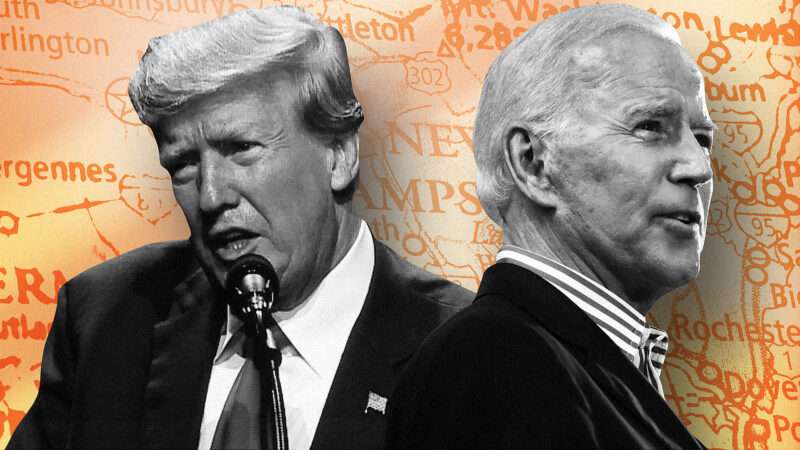
Polls show many Americans are dreading a potential rematch between President Joe Biden and former President Donald Trump in November—and Tuesday's New Hampshire primary might offer the briefest glimpse of an alternate reality where that outcome isn't a near inevitability.
Yep, it might get a little weird.
The results in New Hampshire are unlikely to change the trajectory of the overall race, but for one night both Trump and Biden could be on the defensive. On the Republican side, former South Carolina Gov. Nikki Haley is polling close enough to Trump that an upset is within the realm of possibility, thanks to the state's unusual primary rules (more on that in a bit).
Meanwhile, Biden isn't even on the ballot in New Hampshire's Democratic primary, which creates a possible opening for Rep. Dean Phillips' (D–Minn.) and author Marianne Williamson's long-shot campaigns to score a win against the incumbent. Biden's supporters will have to write in the incumbent's name, but first they'll have to scroll through over a dozen other names (thanks to the state's famously democratic ballot qualification rules).
Whether Biden wins or loses won't actually matter, though: New Hampshire's primary doesn't determine any delegates for the Democratic convention this year. That's a punishment handed down by the Democratic National Committee (DNC) after New Hampshire defied the DNC's plan to have South Carolina and Nevada vote first in this cycle.
Biden—who finished a distant fifth in New Hampshire four years ago before using South Carolina as a springboard to win the nomination—proposed moving those other states ahead of New Hampshire and subsequently refused to participate in the primary when the state refused to give up its historical spot as the first to vote. One has to wonder if he'd have casually ignored the contest even if he was facing a serious challenger.
The Republican race is more competitive, even if only barely. With Florida Gov. Ron DeSantis exiting the contest on Sunday, New Hampshire is a two-horse race between Trump and Haley. That makes New Hampshire the first test of the theory that Trump's hold on the party could be broken by a one-on-one contest.
Working in Haley's favor is the fact that New Hampshire allows independent voters to choose to cast a ballot in either major-party primary—and roughly 40 percent of voters in New Hampshire are registered as independents. Since the Democratic race is uncompetitive, Haley is banking on grabbing a large share of the independent vote (including many would-be Democratic voters who might relish the chance to deal a blow to Trump).
For Haley, this might be pretty close to a must-win situation. If she cannot win in New Hampshire (or in her home state of South Carolina, which votes on February 24), she will be hard-pressed to find any spot on the map where she could top Trump. For that matter, even if she does win on Tuesday, she faces an uphill battle to so-called "Super Tuesday" (March 5) and beyond.
Adding to the potential weirdness in New Hampshire: A robocall that was reportedly received by some voters on Monday urging them not to participate in the election at all. "Although the voice in the robocall sounds like the voice of President Biden, this message appears to be artificially generated based on initial indications," the New Hampshire Attorney General's office said in a statement.
Next time, maybe the scammers will have the guts to urge voters to back Vermin Supreme—the perennial presidential protest candidate whose name does appear on the Democratic ballot in New Hampshire this year.
Barring a debilitating health or legal setback for the two frontrunners, a Trump vs. Biden rematch appears to be a near-certainty. If this primary season is going to deliver a shocking twist, however, we'll likely see it begin taking shape in tonight's results.
The post New Hampshire Might Be the Only Competitive Primary in 2024 appeared first on Reason.com.







